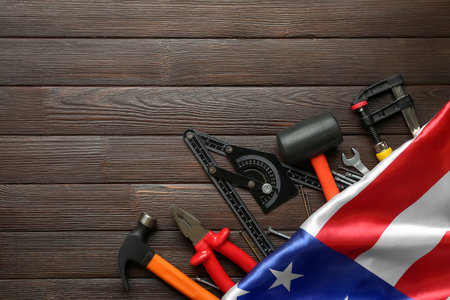Understanding the British Trades Landscape
Embarking on a home improvement or repair project in the UK means stepping into a landscape shaped by tradition, regulation, and a distinct set of trades. The British trades sector encompasses a variety of skilled professionals, from electricians and plumbers to carpenters, bricklayers, decorators, and heating engineers. Each profession has its own standards of training and expertise, often governed by nationally recognised accreditations such as Gas Safe Register for gas engineers or NICEIC for electricians. The regulatory environment is designed to protect homeowners, with many trades requiring specific qualifications or certifications before they can legally carry out certain types of work. For example, electrical installations must comply with Part P of the Building Regulations, while gas work must be performed by Gas Safe registered engineers. Understanding these frameworks is essential—not just for legal compliance but also for ensuring that your project meets safety and quality benchmarks. As you navigate the process of hiring trustworthy professionals, familiarising yourself with common accreditations and relevant regulations will empower you to make informed choices and avoid costly pitfalls.
2. Where to Look: Finding Reliable Tradespeople
Finding a trustworthy tradesperson in the UK can feel like searching for a needle in a haystack, especially if you’re new to home improvements or have recently moved. Fortunately, there are several well-established sources that British homeowners rely on to locate reputable professionals. Understanding these options will help you approach your search with confidence and avoid unnecessary stress or costly mistakes.
Trusted Online Platforms
One of the first ports of call for many is online directories and vetting services. Websites such as Checkatrade and Which? Trusted Traders offer comprehensive databases of reviewed and approved tradespeople across the country. These platforms verify credentials, check insurance details, and publish honest customer feedback, giving you a head start in separating the wheat from the chaff.
| Platform | Main Features | Typical Use Case |
|---|---|---|
| Checkatrade | Verified reviews, background checks, wide range of trades covered | General repairs, renovations, specialist jobs |
| Which? Trusted Traders | Endorsed by consumer group, rigorous assessment process | High-quality workmanship, peace of mind for major projects |
The Power of Local Recommendations
Word of mouth remains one of the most reliable methods for finding good tradespeople in Britain. Ask neighbours, friends, or colleagues for recommendations—often, someone local has already navigated a similar project and can point you towards a reputable builder, plumber, or electrician. Local community groups on social media (such as Facebook or Nextdoor) are also rich sources for honest reviews and direct feedback.
Community Noticeboards and Local Shops
If you prefer a more traditional approach, don’t overlook noticeboards in local shops, post offices, or community centres. Many skilled tradespeople still advertise their services this way, especially in smaller towns and villages where reputation is everything. While less formal than online platforms, these recommendations often carry significant weight within the local community.
Summary Table: Where to Find Tradespeople in the UK
| Source | Advantages | Considerations |
|---|---|---|
| Online Platforms (Checkatrade/Which?) | Vetted professionals; easy comparison; transparent reviews | May not list every local option; some businesses pay for listing |
| Personal Recommendations | Tried-and-tested; tailored to your area; trusted feedback | Limited by your social network’s experience; subjective opinions |
| Community Noticeboards/Shops | Supports local business; informal references; easy contact info | Lacks digital verification; fewer details upfront about qualifications |
| Social Media Groups (Facebook/Nextdoor) | Diverse opinions; real-time responses; visual proof via photos/reviews | Potential for biased or fake recommendations; privacy concerns if posting requests publicly |
By combining these sources—digital and traditional—you can cast a wide net and shortlist tradespeople who meet both professional standards and community approval. This hybrid approach not only increases your chances of finding someone reliable but also helps foster trust between homeowner and tradesperson from the very start.
![]()
3. Vetting and Verifying Your Tradesperson
Once you’ve shortlisted potential tradespeople for your home project, the next crucial step is to thoroughly vet and verify their credentials. This isn’t just a matter of due diligence—it’s about safeguarding your investment and ensuring peace of mind. In the UK, reputable professionals should readily provide evidence of their qualifications, insurance, and previous work.
Check Qualifications and Memberships
Begin by asking for documentation of any relevant qualifications or training. For certain jobs—such as gas or electrical work—membership in recognised UK trade bodies is essential. Gas engineers must be registered with Gas Safe, while electricians should hold accreditation with NICEIC or another government-approved scheme like NAPIT or ELECSA. You can easily verify these registrations online via the respective official websites.
Insurance: Don’t Be Afraid to Ask
A trustworthy tradesperson will have public liability insurance as standard, protecting both you and them in case of accidents or damage. Always ask to see a copy of their insurance certificate. If they hesitate or make excuses, consider this a red flag. Insurance is not just a formality; it’s a key indicator of professionalism and responsibility in the British trades.
References and Previous Work
Request references from previous clients, ideally from projects similar to yours. Contact these referees directly if possible, and don’t shy away from asking detailed questions about reliability, workmanship, and communication. Some tradespeople may also have online portfolios or be rated on platforms such as Checkatrade or TrustMark, both widely used in the UK.
The Value of Transparency
A reliable British tradesperson will be transparent about their credentials and happy to discuss their experience. Taking the time to check these details not only minimises risk but also sets a clear tone of mutual trust and professionalism for your project moving forward.
4. Getting Quotes and Setting Expectations
Securing a trustworthy tradesperson in the UK is only half the challenge; the next crucial step is obtaining transparent, detailed quotes and establishing clear expectations from the outset. The British trades sector has a longstanding tradition of quoting for jobs, but not all quotes are created equal. Understanding what to expect—and what to demand—can save you from nasty surprises down the line.
Requesting Written Quotes
Always insist on written quotes rather than relying on verbal agreements. A written quote should detail every aspect of the work, including materials, labour, VAT, and any potential additional charges. This documentation protects both parties and sets a solid foundation for your project.
Key Elements to Include in a Quote:
| Element | Description |
|---|---|
| Scope of Work | Detailed breakdown of tasks and responsibilities |
| Materials & Labour | Itemised list with costs for each component |
| Timeline | Start date, estimated completion date, and milestones if applicable |
| Total Cost (incl. VAT) | Clear statement of final price with VAT included |
| Payment Terms | Deposit required, instalment schedule, and final payment conditions |
| Guarantees/Warranties | Details of any guarantees on workmanship or materials |
Comparing Quotes: More Than Just Price
It’s tempting to go straight for the cheapest quote, but in the UK, as elsewhere, you often get what you pay for. Compare at least three quotes side-by-side, looking for discrepancies in scope, materials quality, and timelines—not just cost. If a quote seems unusually low or high, ask for clarification in writing; reputable tradespeople will be happy to explain their pricing.
Sample Comparison Table:
| Trade Professional | Total Cost (£) | Timeline (weeks) | Materials Quality | Guarantee Length (years) |
|---|---|---|---|---|
| Ace Builders Ltd. | 5,000 | 4 | High (British Standard) | 5 |
| Bespoke Renovations | 4,250 | 6 | Medium (Generic Brands) | 2 |
| Cottage Craftsmen Co. | 5,500 | 4.5 | Premium (Eco-certified) | 10 |
Tackling Timelines and Deliverables Upfront
The British weather is infamous for causing delays; however, your contract should specify realistic start and finish dates. Agree on how delays will be handled—will there be penalties or revised deadlines? Clarity here ensures that both sides have shared expectations and recourse if things go awry.
Troubleshooting: What If Things Change?
If additional work crops up mid-project—a common occurrence—request an updated written quote before proceeding. Never accept “off-the-cuff” prices or vague assurances; this is where misunderstandings flourish.
Navigating British trades successfully hinges on open communication and documented agreements. By following these best practices for quoting and expectation-setting, you’ll be well-placed to enjoy a smooth renovation or repair experience with minimal stress.
5. British Etiquette: Communicating and Building Trust
One of the most crucial yet overlooked aspects of hiring tradespeople in the UK is understanding and respecting British etiquette. Communication here is often more subtle than direct, and a little politeness goes a long way toward establishing a smooth, professional relationship. When you first contact a tradesperson, begin with a courteous greeting and clear introduction, such as “Good morning, my name’s Sarah and I’m looking for help with…” This sets the right tone from the outset.
Politeness Is Paramount
British culture places high value on politeness and understatement. Phrases like “Would you mind…”, “If it’s not too much trouble…”, or “Could I possibly ask…” are common when making requests. Avoid being overly blunt or demanding, as this can inadvertently put people off. Remember, a simple “please” and “thank you” can help foster goodwill and cooperation throughout your project.
Building Rapport with Tradespeople
Building rapport isn’t just about friendly conversation—it’s also about demonstrating respect for their expertise. Ask questions about their approach, show genuine interest in their recommendations, and listen attentively. While small talk about the weather is almost obligatory in Britain, it can also serve as an icebreaker to make everyone feel at ease before discussing specifics.
Clear Expectations, Gentle Feedback
Set out your expectations clearly but avoid sounding confrontational. For example, instead of saying “This needs to be done by Friday,” try “Would it be possible to have this completed by Friday?” If issues arise, address them calmly and privately. Offer constructive feedback rather than criticism; for instance, “I noticed this part wasn’t quite what I expected—would you mind having another look?”
Mutual Respect Builds Lasting Trust
The foundation of any successful working relationship is mutual respect. Pay invoices promptly, offer tea or coffee during site visits (a British classic), and acknowledge good work with sincere appreciation. These gestures build trust and increase the likelihood that tradespeople will prioritise your project now and in the future. Understanding these nuances of British communication not only smooths the process but also helps ensure that your home project runs seamlessly from start to finish.
6. Dealing with Issues: Disputes and Consumer Rights
Even with thorough research and due diligence, issues can occasionally arise when working with tradespeople. Understanding your rights as a consumer under UK law is essential for ensuring you’re protected if things go awry. The Consumer Rights Act 2015 gives you clear entitlements: any service must be carried out with reasonable care and skill, within a reasonable time, and at a fair cost. If the work falls short of these standards, you are legally entitled to ask for it to be put right or, in some cases, to receive a refund.
If problems do occur, start by discussing them directly with your tradesperson. Often, an honest conversation can resolve misunderstandings or mistakes without further escalation. Document your concerns—keep records of emails, texts, photos, and invoices—as this evidence will be valuable should you need to escalate the issue.
If you’re unable to reach an agreement, there are several avenues for support. Organisations like Citizens Advice offer free guidance tailored to UK consumers. If your tradesperson is part of a trade association or accredited scheme (such as TrustMark or the Federation of Master Builders), these bodies often provide dispute resolution services and can mediate on your behalf.
For more serious disputes where informal resolution fails, you may consider alternative dispute resolution (ADR) schemes or even small claims court as a last resort. ADR is typically quicker and less formal than court proceedings and can help both parties reach a fair compromise without excessive stress or cost.
Ultimately, being proactive—knowing your legal standing, keeping clear records, and seeking expert advice—puts you in a strong position to resolve disputes amicably. With the right approach, most issues can be settled constructively, ensuring your home project remains on track and relationships stay professional.


